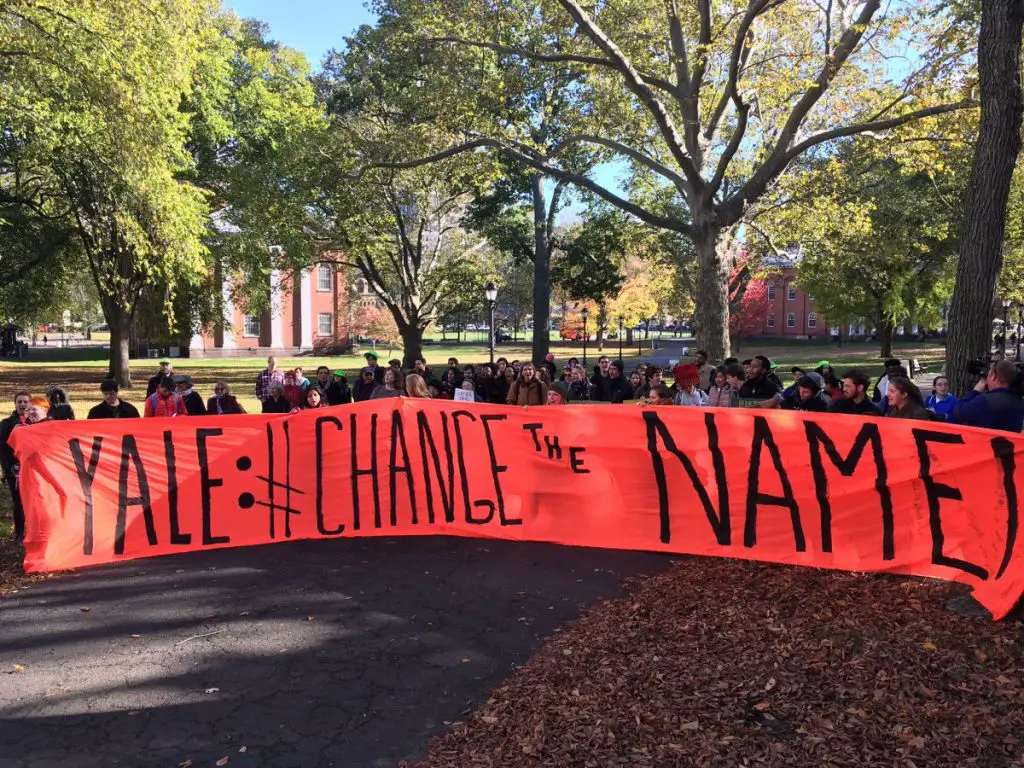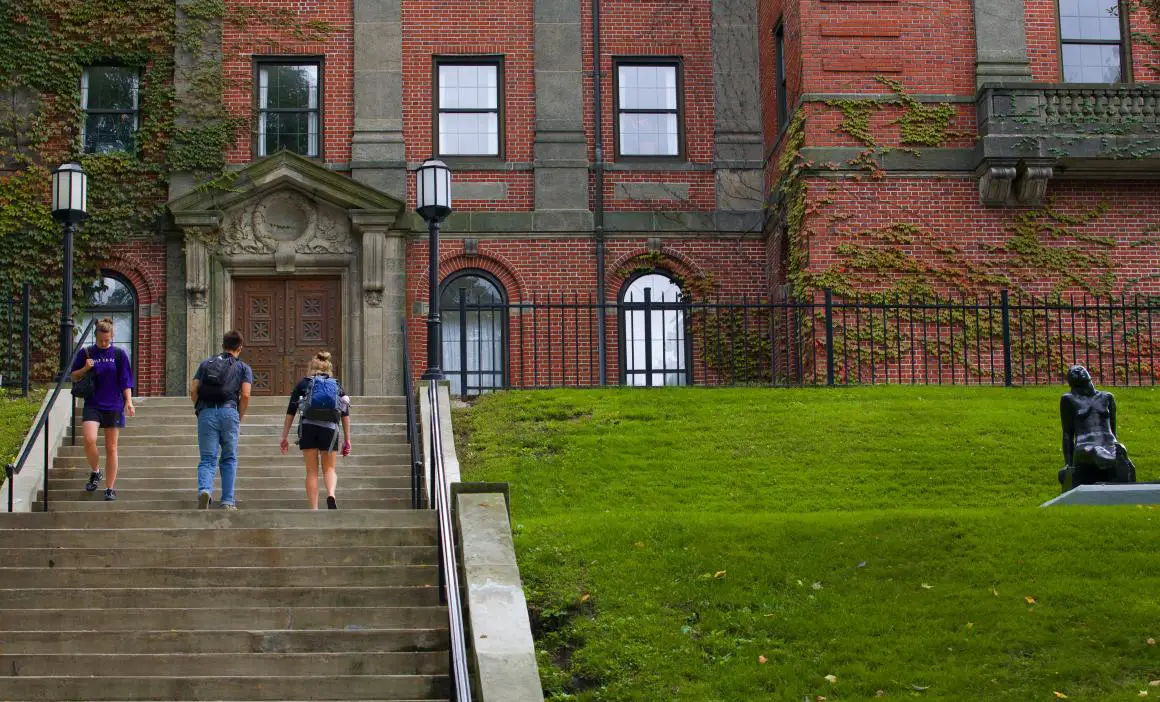Last semester, the College of the Holy Cross in Worcester, Massachusetts, became the latest in a string of Catholic and Christian universities nationwide to consider ditching the Crusader mascot. As early as 2000, institutions have dropped the medieval warrior from their brand in response to concerns that the mascot’s association with the historical Crusades may promote sentiments of violence and Islamophobia.
It’s a tale as old as time, or at least as old as the millennium, and Crusaders aren’t the only incendiary mascots rousing more than team spirit. From the NFL’s long-running Washington Redskins controversy to recent incentives among colleges nationwide to cut nominal ties with divisive historical figures, institutions of every rank and order have finally answered the timeless question, and it turns out there’s a lot in a name.
While proponents of these efforts to depose potentially problematic names and iconography often frame it as a progressive movement towards a more enlightened and socially conscious view of the past, changing these names may actually accomplish just the opposite. At best, these efforts are a quick fix—a preventative measure to fight off a social justice firestorm. At worst, they are deliberate censorship. Erasing an unflattering name doesn’t right the wrongs of the past. It just buries them.
The Ku Klux Krusader
For Holy Cross, this controversy is compounded by the fact that the school’s newspaper, “The Crusader,” happens to share its name with a publication circulated by the Ku Klux Klan. This discovery was allegedly brought to light earlier this year when a group of Holy Cross faculty members sent a letter to the editors of the paper after an incendiary editorial from a third party not associated with the college appeared in the newspaper’s mailbox, reportedly preaching the dangers of “white genocide” and condemning “liberal media.”
While this claim was later discredited in a subsequent editorial by chief opinions editor Sam Arciprete, who maintains that the debate surrounding the paper’s name “was not because we were being confused in any way with the KKK newspaper,” the original letter to the editors suggests otherwise. Cosigned by forty-eight faculty members, the appeal cites the shared name, along with “growing anti-Muslim tensions in our country,” as chief among the factors in their decision to initiate the discussion.
Whether the debate has its origins in unsavory associations with the KKK, in potentially Islamophobic connotations of the mascot’s historical context or in concerns that the imagery promotes more violence than good Christian chivalry, both sides of the conversation have launched their crusade, some in support of the Crusader, and others to get him to lay down his sword.
“The Ravages of Political Correctness”
Such debates have become so popular in recent years that the rhetoric surrounding them is all but scripted. Proponents and opponents enter the arena, and whether you call them the left and right, liberals and conservatives or progressives and traditionalists, the formula remains standard: one party is offended, and the other is offended by their opponent’s ease of offense. Phrases like “social justice warrior” and “pandering to the left” are exchanged. Someone drops the word “triggering,” and someone else hurls it back in passive-aggressive quotation marks. End scene.
Of course, the real danger here is not the “ravages of political correctness,” a phrase coined by a Holy Cross faculty member in an op-ed on the issue for the school paper, but the self-serving censorship these efforts often promote under the guise of progressivism. Institutions change an offensive name reminiscent of a dark period in history and come out with a clean slate. It’s an often overlooked paradox for such an increasingly common issue, but efforts to right the wrongs of the past in the name of political correctness often dissolve into white-washing to the most politically incorrect degree.
Saved by the Hyphen
Take, for example, another recent—and familiar—debate the college has entertained. Back in 2015, Holy Cross president Father Philip Boroughs assembled a committee to launch a discussion about renaming Mulledy Hall, a campus residence hall named after Holy Cross founder Rev. Thomas F. Mulledy, whose “complex” connection to slavery, according to Boroughs, includes the sale of nearly three hundred Jesuit-owned slaves to pay off Georgetown University’s debt. The discussion began around the same time Yale made headlines for a similar controversy involving Calhoun College’s nominal ties to nineteenth-century white supremacist John Calhoun.

In spring 2016, Holy Cross concluded months of discussion on the issue with a conciliatory hyphen, effectively changing the name of contention to Brooks-Mulledy Hall. The building’s new nominal addendum has its namesake in former College president, Rev. John Brooks, in homage to his 1968 efforts to recruit “a number of remarkable African-American men in a deliberate attempt to integrate our campus.” While Boroughs neglected to disclose the specific “number” of Brooks’ African-American beneficiaries, it is apparently enough to cancel out their 277 enslaved predecessors, based, I suppose, on current conversion rates.
Essentially, the administration haphazardly slapped a flattering piece of wall paper over a regrettable stain on the College’s past in the hopes that one man’s contributions to the African-American community would rectify, or at least distract from, the atrocities of another.
The Purple Letter
With the mascot debate, the College stands to make the same mistake, engineering a simple name change and strolling off shining their good-guy badges while any unflattering ties to the past lay covered up in a shallow grave.
If an institution is serious about owning up to past wrongs and atoning for the sins of days gone by, should they really be able to escape it with a quick cover-up? If Holy Cross really wants to take responsibility for the atrocities of the Crusades, shouldn’t they wear the signature purple knight Hawthorne-style, bearing is as the symbolic burden of their crimes?
Then again, maybe it’s time to let bygones be bygones, especially bygones dating back a thousand or so years. Ultimately, whether or not the name “crusader” carries any anti-Muslim sentiments, and many name-change opponents argue it does not in modern dialect, issues surrounding the Islamic community today don’t really have anything to do with knights charging into battle. Unfortunately, they’ve got better things to worry about.
Ultimately, no one mascot, institution or religious group is responsible for historical wrongs. Truly progressive efforts would be better spent on the here and now, rather than quibbling over the past.
*Study Breaks incorrectly stated that the College of the Holy Cross had changed their mascot, which is incorrect. They are only debating changing the mascot, a conversation that will ensue this fall.

















